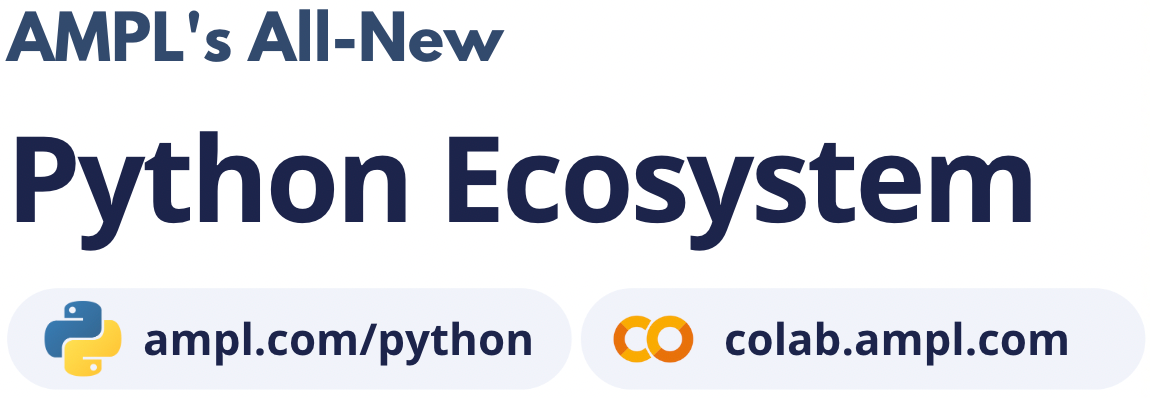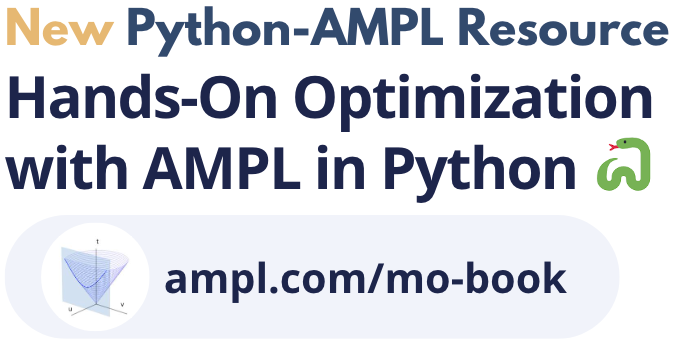Entity#
-
class Entity#
An AMPL entity such as a parameter or a variable.
An entity can either represent a single instance of an AMPL algebraic entity or, if the corresponding declaration has an indexing expression, a mapping from keys to instances. In the derived classes, it has methods to access instance-level properties which can be used in case the represented entity is scalar.
To gain access to all the values in an entity (for all instances and all suffixes for that entities), use the function Entity::getValues().
The algebraic entities which currenty have an equivalent class in the API are:
Variables (see ampl::Variable)
Constraints (see ampl::Constraint)
Objectives (see ampl::Objective)
Sets (see ampl::Set)
Parameters (see ampl::Parameter)
Tables (see ampl::Table)
Public Functions
-
inline std::string name() const#
Get the name of this entity.
-
inline std::string type() const#
Get the type of this entity.
-
inline bool isValid() const#
Returns true if the entity is in a valid state.
That is, if the underlying intepreter is still open and the related AMPL object is still allocated
-
inline std::size_t indexarity() const#
Get the indexarity of this entity (sum of the dimensions of the indexing sets).
This value indicates the arity of the Tuple to be passed to the method BasicEntity::get() in order to access an instance of this entity. See the following AMPL examples
var x; # indexarity = 0 var y {1..2}; # indexarity = 1 var z {1..2,3..4}; # indexarity = 2 var zz {{(1, 2)}}; # indexarity = 2
- Returns:
The sum of the dimensions of the indexing sets or 0 if the entity is not indexed
-
inline bool isScalar() const#
Check whether this entity is scalar.
Equivalent to testing whether indexarity() is equal to zero.
- Returns:
True if the entity is scalar (not indexed over any set)
-
inline std::size_t numInstances() const#
Get the number of instances in this entity.
-
inline StringArray getIndexingSets() const#
Get the AMPL string representation of the sets on which this entity is indexed.
The obtained vector can be modified without any effect to the entity.
- Returns:
The string representation of the indexing sets for this entity or an empty array if the entity is scalar
-
inline StringArray xref() const#
Get the names of all entities which depend on this one.
- Returns:
An array with the names of all entities which depend on this one.
-
inline DataFrame getValues() const#
Get the principal values of this entity as a DataFrame. The specific returned value depends on the type of entity (see list below).
- For:
Variables and Objectives it returns the suffix
valParameters it returns their values
Constraints it returns the suffix
dualSets it returns all the of the set. Note that it does not
apply to indexed sets. See SetInstance::getValues
- Returns:
A DataFrame containing the values for all instances
-
inline DataFrame getValues(StringArgs suffixes) const#
Get the specified suffixes value for all instances in a DataFrame.
- Parameters:
suffixes – Suffixes to get
- Returns:
A DataFrame containing the specified values
-
inline void setValues(DataFrame data)#
Set the values of this entiy to the correponding values of a DataFrame indexed over the same sets (or a subset). This function assigns the values in the first data column of the passed dataframe to the entity the function is called from. In particular, the statement:
x.setValues(y.getValues());
is semantically equivalent to the AMPL statement:
let {s in S} x[s] := y[s];
- Parameters:
data – The data to set the entity to
-
inline std::string toString() const#
Returns a string representation of this entity (its declaration)
-
inline Entity()#
Constructor to allow the construction of arrays of entities.
Friends
- friend class AMPL
- friend class DataFrame
- friend class EntityArgs
- friend class Instance
BasicEntity#
- template<class InstanceClass> ampl::BasicEntity : private INHERITANCE Entity
Infrastructure class to enable the inheriting classes type-safe access to instances.
Instance access
Methods to access the instances which are part of this Entity
-
inline InstanceClass get() const#
Get the instance corresponding to a scalar entity.
- Throws:
runtime_error – if the entity has been deleted in the underlying AMPL interpreter
logic_error – if the entity is not scalar
- Returns:
The corresponding instance.
-
inline InstanceClass operator[](TupleRef index) const#
-
inline InstanceClass get(TupleRef index) const#
Get the instance with the specified index.
- Parameters:
index – The tuple specifying the index
- Throws:
out_of_range – if an instance with the specified index does not exist
out_of_range – if the entity has been deleted in the underlying AMPL interpreter
ampl::UnsupportedOperationException – if the entity is scalar
- Returns:
The corresponding instance
-
inline InstanceClass operator[](VariantRef v1) const#
-
inline InstanceClass get(VariantRef v1) const#
Get the instance with the specified index.
-
inline InstanceClass get(VariantRef v1, VariantRef v2) const#
Get the instance with the specified index.
-
inline InstanceClass get(VariantRef v1, VariantRef v2, VariantRef v3) const#
Get the instance with the specified index.
-
inline InstanceClass get(VariantRef v1, VariantRef v2, VariantRef v3, VariantRef v4) const#
Get the instance with the specified index.
- Parameters:
v1 – The VariantRef specifying the first element of the indexing tuple
v2 – The VariantRef specifying the second element of the indexing tuple
v3 – The VariantRef specifying the third element of the indexing tuple
v4 – The VariantRef specifying the fourth element of the indexing tuple
- Throws:
out_of_range – if an instance with the specified index does not exist
runtime_error – if the entity has been deleted in the underlying AMPL interpreter
ampl::UnsupportedOperationException – if the entity is scalar
- Returns:
The corresponding instance
-
inline explicit BasicEntity(internal::EntityBase *entity)#
Constructor allowing cross conversions.
Public Types
-
typedef internal::CountedIterator<internal::EntityWrapper<InstanceClass>> iterator#
Iterator for entities, represented by an iterator pointing to elements of type std::pair<TupleRef, InstanceClass>
Public Functions
-
inline iterator find(TupleRef t) const#
Searches the current entity for an instance with the specified index.
- Returns:
an iterator to the wanted entity if found, otherwise an iterator to BasicEntity::end.
-
inline StringArray getIndexingSets() const#
Get the AMPL string representation of the sets on which this entity is indexed.
The obtained vector can be modified without any effect to the entity.
- Returns:
The string representation of the indexing sets for this entity or an empty array if the entity is scalar
-
inline DataFrame getValues() const#
Get the principal values of this entity as a DataFrame. The specific returned value depends on the type of entity (see list below).
- For:
Variables and Objectives it returns the suffix
valParameters it returns their values
Constraints it returns the suffix
dualSets it returns all the of the set. Note that it does not
apply to indexed sets. See SetInstance::getValues
- Returns:
A DataFrame containing the values for all instances
-
inline DataFrame getValues(StringArgs suffixes) const#
Get the specified suffixes value for all instances in a DataFrame.
- Parameters:
suffixes – Suffixes to get
- Returns:
A DataFrame containing the specified values
-
inline std::size_t indexarity() const#
Get the indexarity of this entity (sum of the dimensions of the indexing sets).
This value indicates the arity of the Tuple to be passed to the method BasicEntity::get() in order to access an instance of this entity. See the following AMPL examples
var x; # indexarity = 0 var y {1..2}; # indexarity = 1 var z {1..2,3..4}; # indexarity = 2 var zz {{(1, 2)}}; # indexarity = 2
- Returns:
The sum of the dimensions of the indexing sets or 0 if the entity is not indexed
-
inline bool isScalar() const#
Check whether this entity is scalar.
Equivalent to testing whether indexarity() is equal to zero.
- Returns:
True if the entity is scalar (not indexed over any set)
-
inline std::string name() const#
Get the name of this entity.
-
inline std::size_t numInstances() const#
Get the number of instances in this entity.
-
inline void setValues(DataFrame data)#
Set the values of this entiy to the correponding values of a DataFrame indexed over the same sets (or a subset). This function assigns the values in the first data column of the passed dataframe to the entity the function is called from. In particular, the statement:
x.setValues(y.getValues());
is semantically equivalent to the AMPL statement:
let {s in S} x[s] := y[s];
- Parameters:
data – The data to set the entity to
-
inline std::string toString() const#
Returns a string representation of this entity (its declaration)
-
inline StringArray xref() const#
Get the names of all entities which depend on this one.
- Returns:
An array with the names of all entities which depend on this one.
-
inline InstanceClass get() const#
EntityArgs#
-
class EntityArgs#
Represents a list of entities, to be passed as arguments to various API functions.
Public Functions
-
inline EntityArgs(Entity arg0, Entity arg1)#
Constructor from entities.
- Parameters:
arg0 – First entity
arg1 – Second entity
-
inline EntityArgs(Entity arg0, Entity arg1, Entity arg2)#
Constructor from entities.
- Parameters:
arg0 – First entity
arg1 – Second entity
arg2 – Third entity
-
inline EntityArgs(Entity arg0, Entity arg1, Entity arg2, Entity arg3)#
Constructor from entities.
- Parameters:
arg0 – First entity
arg1 – Second entity
arg2 – Third entity
arg3 – Fourth entity
-
inline EntityArgs(const Entity args[], std::size_t size)#
Constructor from an array of entities.
- Parameters:
args – An array of entities
size – Size of the array
-
inline const internal::EntityBase *const *getArgs() const#
Get access to the represented entities.
-
inline std::size_t size() const#
Number of represented entities.
-
inline EntityArgs(Entity arg0, Entity arg1)#


